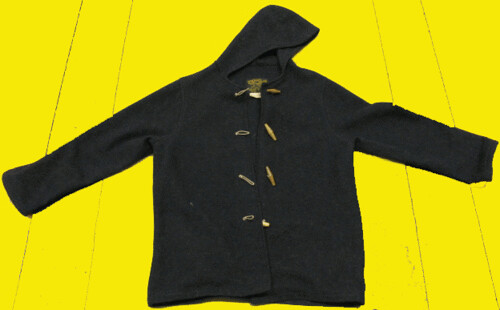Monday, February 20, 2006
coat
The blog has been slow work. To remedy this, I'm going to include a few things from emails, so there will be a bit of time travel over the next few days ...
from a mail to my father on Sunday -
I have finally bought a coat. I was lucky that I asked the sales woman whether the green coat I was trying on looked to big on me (for some reason all Dutch coats are too wide across the shoulders) and she said yes, and started to suggest different options. It is usually OK to ask a sales-person's advice in shops - because the response is almost always honest. In the end, I found a grey duffle coat, which is, by some strange co-incidence an Australian brand, and it fits well, and is very warm. So my walks in the morning are now especially nice.
I have noticed that it is a matter of etiquette here to eat toasted sandwiches with a knife and fork. It's something that I generally ignore, but when, the other day, I ordered a sandwich on 'stokbrood' (stick bread, a baguette) it turned out to be an open sandwich and I had to struggle through the experience with my knife and fork. It was worth it and I was hungry. I find this a small but somehow significant point of difference between Australian and Dutch culture - that it is generally 'not done' to eat with one's hands (especially when sitting at a table, but hot chips also come with a small plastic fork ...), whereas in Australian culture there is a whole array of things to eat with one's hands. Whether you follow this or not seems to be an indication of your class, or even your "Dutchness".
I have also learnt over the last few weeks not to take the Dutch manner of speaking always in the imperative to heart. My friend Annelys notes that the Dutch are known throughout Europe for giving unsolicited advice. So a conversation runs something like a series of statements and commands - which is different from the english mode of conversation which is has many more questions and is more open ended. I also have to take into account that the conversation is being conducted usually in someone's second, third or forth language. ...Something that I have been reflecting on is the world's increasing 'proficiency' with English. I find here that English is the language of commerce, business and trade - and this is reflected in the way that it is used. So I often feel I get the wrong impression of people's character and motives - that they are merely interested in the opportunity that I might offer.
I have started to read a novel by a Dutch author from den Haag, Louis Couperus. The novel is called called Inevitable, and it was published in 1900. It would probably compare well with Henry James - if I had got that far in my reading. Even though it is in translation, I can hear the difference in the way that it is written, again, a series of statements, confident and precise. Ewoud says that he is one of the 'greats' in Netherlands literature & admired for his use of language, style & wit.
There are now many responses to the email that we sent out asking people to participate in my collaborative drawing project. I have met two of them and will start making drawings this week. I spent a lovely few hours with an Israeli/Dutch woman in her studio discussing her work and also talking about living in the Netherlands. She spoke about being in Israel as a feeling of not belonging in a particular community (one parent was a Sephardic Jew, the other Ashkenazi). Afterward, I was thinking about the Netherlands being the place where it is possible to be in this in-between state ... it is indeed a place full of people who are either physically or spiritually or culturally stateless. Although the Netherlands, like so many other places in the world, is increasingly less welcoming to people who find themselves inclined or forced to leave their country of birth - more anxious about it's borders and 'national identity'.
Another point of reflection has been a statement by American philosopher Stanley Cavell concerning America - that it is a fiction, a home that everyone imagines, but which no-one ever really arrives at. It is always unapproachable. (Emerson's phrase from his essay "Experience" ... I feel a new heart beating with the love of the new beauty. I am ready to die out of nature and be born again into this new yet unapproachable America I have found in the West...) I think that, during the 20th Century, many places were like America - places of new beginning for people who were dissatisfied or displaced - Australia, Canada, the Netherlands ... but this period of migration and optimism seems to be truly historical now. Countries are fortresses, not places of the imagination, not questions about what it means to belong to a place.
